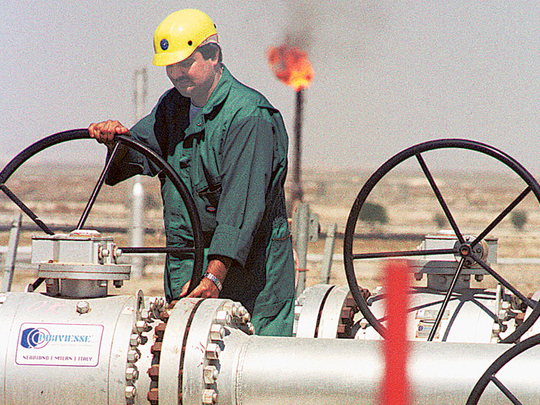
Abu Dhabi: Oil prices extended their gains for a sixth straight week on Friday, as oil markets continued to rebalance with production cuts and global economies reopening from lockdown.
And with Opec+ agreeing to extend production cuts of 9.6 million barrels per day throughout the month of July, oil prices can expect a further boost when markets reopen.
Brent was trading on $42.30 on Friday’s closing - as the global benchmark found itself closing above $40 in as many months – with West Texas Intermediate (WTI) on $39.55, as the American benchmark also moved upwards towards the $40 mark. The recovery in prices is a stark contrast to the position oil markets found themselves in back in April, which saw historic losses and at one point WTI entering into negative pricing.
“Spurned on by the tremendous gains in oil prices over the past two months, Opec+ countries likely saw the benefit of holding production lower for longer—even if for just an additional month,” said Edward Bell, commodity analyst at Emirates NBD.
“While an additional month of deep production cuts may not have an enormous impact on headline oil market balances it will still help to reinforce positive sentiment around oil prices and should dispel any short-term concerns about a break down in oil diplomacy between Russia and Saudi Arabia,” he added.
The main challenge facing Opec+ according to Bjornar Tonhaugen, head of oil markets at Rystad Energy, would be to ensure compliance from producers falling short on their quotas. Major producers such as Iraq and Nigeria were both well short of their cuts, with Iraq only reaching 42 per cent of its agreed cuts and Nigeria on 32 per cent during the month of May.
“The only potential Achilles heel, in what seemingly is an expected extension of current deep cuts through July, is the caveat of sub-compliant members requirement to compensate for lack of compliance to date in the coming months of July-September.
“Countries such as Iraq and Nigeria will struggle, we believe, to compensate fully, which puts increased pressure on the coherence of the alliance,” he added.
The extended cuts and rise in prices could also hold the potential for US shale producers to increase production again according to Bell, which could result in prices going back down and Opec+ reconsidering their own production cuts.
“WTI futures are not far off prices that allow production to stabilise in some large plays—such as the Permian—meaning a leveling off in declines could emerge over the coming weeks,” he said.
“Prices would need to push higher, and on a sustained basis for companies to take capex decisions and add production, rather than keep existing projects intact,” he added.
“We see little impetus for an official, government-mandated restriction on output in the US, particularly as the economy is only tentatively emerging from its Covid-19 shutdown…Mandatory production cuts that benefit Opec+ but threaten the job market in pro-Trump states would find short shrift with the incumbent administration,” Bell said.








